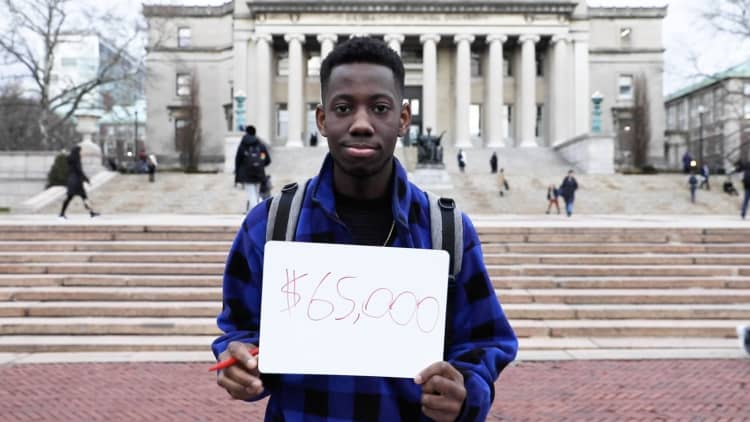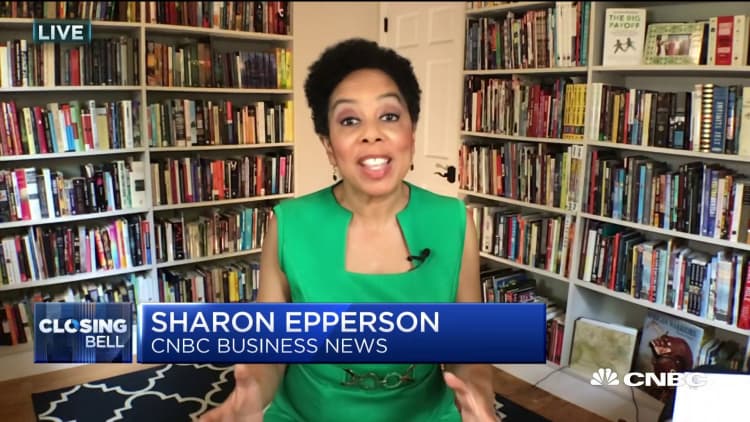During his campaign, President Joseph Biden proposed creating a program that offers $10,000 of undergraduate or graduate student debt relief for every year of national or community service, up to five years and a total of $50,000.
When CNBC Make It spoke with economists about the proposal in October, many said the policy showed promise. "I think his loan forgiveness proposal, and prioritizing student loan debt, is really a no-brainer," said Judith Scott-Clayton, an associate professor of economics and education at Columbia University.
Since then, House and Senate Democrats have urged President Biden to "broadly" forgive up to $50,000 of federal debt through executive order, an approach Senate majority leader Chuck Schumer has reiterated Biden should take during his first 100 days in office.
Biden is now expected to call on Congress to forgive $10,000 in student debt for all borrowers — a simplification of what he touted on the campaign trail and a step down from what leaders of his own party have called for.
Here's what experts have to say about the potential impact of $10,000 in universal student debt forgiveness, as well as its likelihood.
"A good thing"
The experts CNBC Make It spoke with agreed that the student debt crisis needs to be addressed and that student loan forgiveness has the potential to be a powerful tool for addressing mistakes of the past.
"I think [student debt forgiveness] would ease people's financial anxiety," says Rebecca Safier, a student loan expert at student-loan management site Student Loan Hero, citing a recent survey of 2,000 Americans in which 64% said having their loans reduced by $10,000 would improve their life significantly. "Student loan debt has been a huge burden for years, and now people are dealing with unemployment, loss of income, general anxiety and stress from the pandemic. So any kind of student loan forgiveness that could ease the burden would be helpful for student loan borrowers."
But Safier adds that the same survey found that only one in four borrowers believe they will actually have their student loans forgiven by the Biden administration.
"I definitely think some measure of student debt forgiveness is a good thing. I see it as basically recompense for a string of bad policy failures," says Josh Bivens, economist and director of research at the Economic Policy Institute. "Policymakers cut back funding for higher education, and these cutbacks were made up with huge increases in tuition costs, forcing people to take on more debt. Policymakers failed to police diploma-mills and the predatory for-profit sector. And finally, policymakers made decisions that prolonged the recovery from the Great Recession far, far longer than it had to be, making it super-hard for many debt-holders to earn enough reliably to pay off debts."
He continues, "I think a measure of forgiveness could help undo lots of this damage – I'd personally go higher than $10,000, but it's a start."
"There should be broad student loan forgiveness," says Kevin Walker, a student loan expert and publisher of CollegeFinance.com. "It's something that would be good for the borrowers, and for the country, and also for the treasury because default rates on student loans are very high and so a lot of costs are already going to be incurred by the U.S. government, the taxpayer. Figuring out a way to provide relief to individual borrowers, understanding that a lot of that expense for the relief was already going to be incurred over time through defaults, makes a lot of sense. The hard part is figuring out what's the right amount to forgive."

Who would student debt forgiveness benefit?
Exactly how much student debt should be forgiven, and who should receive forgiveness, appears to be central to the debate over Biden's current preferred policy.
For instance, higher education expert Mark Kantrowitz suggests that forgiving student debt for those who owe less than $10,000 (as opposed to eliminating $10,000 in student debt for all borrowers) could be more cost-efficient.
"Forgiving $10,000 in federal student loan debt per borrower would cost $377 billion and would eliminate all federal student loan debt for about a third of borrowers. If loan forgiveness was limited to just borrowers who owe $10,000 or less, the cost would be $75 billion," estimates Kantrowitz.
But Walker says the universal $10,000 figure strikes a good balance of providing significant relief to all borrowers while also helping those who are struggling the most.
"$10,000 would benefit everyone, which in and of itself is a form of stimulus which would help in the current economic environment," he says. "And the pain of student loan payments are disproportionately felt by those who borrow a relatively small amount. Borrowers who owe $10,000 or less tend to be the ones who are closest to the point of default, who are struggling the most to make payments."
He argues that while it may seem "counterintuitive," borrowers with the highest student debt burdens are not always the individuals who need the most assistance.
"When it comes to people who owe $50,000 or more, there are definitely some people in there who are struggling," says Walker. "But they often tend to be graduate and in particular, professional school graduates, who often have relatively good financial prospects."
Confronting college costs
In order for a student loan relief policy to be sustainable, experts stress that college costs must also be curtailed.
During the presidential campaign, Biden supported making public college tuition-free for all families with incomes below $125,000 — a policy Georgetown economists estimate would pay for itself within 10 years.
"We do need a larger plan about what to do about college access and affordability going forward," says Bivens. "Forgiving debt but then doing nothing about the system that produced it would be weird."
"Any debt forgiveness program puts a Band-Aid on a massive gaping wound. How do we fix the wound first? Many believe that the real problem is the actual overall cost of college," says Stacey MacPhetres, senior director of education finance at workplace education benefits company Bright Horizons. "Any proposals that lead us in that direction make a lot of sense."
And even though college costs have steadily increased over the past several decades, MacPhetres predicts that tuition-free college may be closer than some may realize given how low costs currently are at many community college programs.
Safier says her research suggests that 42% of Americans support tuition-free community college, including 31% of Republicans, making it one of Biden's most popular education-related campaign proposals.
Political probability
There are still serious questions as to whether legislators will pass student debt forgiveness.
"Generally, Democrats support loan forgiveness while Republicans do not," says Kantrowitz. "President Biden will likely wait until late summer or early fall to propose student loan forgiveness legislation, to avoid having it interfere with legislative proposals for which there is common ground. A proposal for $10,000 in student loan forgiveness might get some Republican support because it is modest in cost."
"I would like to see the Biden admin do this administratively – they have a crowded legislative agenda and this is one of the things they can do with executive power," says Bivens. "So, anything they can do themselves and de-clutter the legislative bottleneck is something I think they should do."
"These ideas of student loan forgiveness and tuition-free college seemed out of reach years ago, but they're definitely becoming more and more part of the national conversation," says Safier. "I can certainly see it happening.
"But it remains to be seen."
Don't miss:



